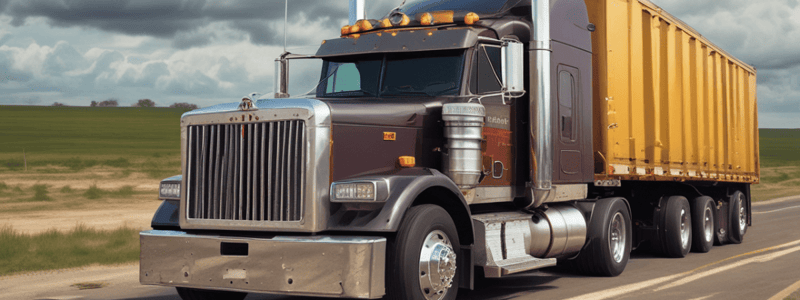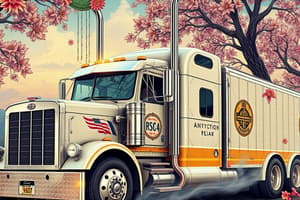Podcast
Questions and Answers
What is the primary cause of trucking accidents?
What is the primary cause of trucking accidents?
- Negligence (correct)
- Federal regulations
- Vicarious liability
- Jackknife accidents
What is the term for a trucking company being held responsible for the actions of their driver?
What is the term for a trucking company being held responsible for the actions of their driver?
- Negligence
- Vicarious liability (correct)
- Accident reconstruction
- Federal regulations
What is the purpose of preserving evidence in a trucking case?
What is the purpose of preserving evidence in a trucking case?
- To calculate damages
- To prevent spoliation of evidence (correct)
- To prove negligence
- To determine fault
What type of accident occurs when a truck crosses into oncoming traffic?
What type of accident occurs when a truck crosses into oncoming traffic?
What is the purpose of consulting with experts in a trucking case?
What is the purpose of consulting with experts in a trucking case?
What type of damages compensate for medical expenses and lost wages?
What type of damages compensate for medical expenses and lost wages?
What is the term for the awards intended to punish the trucking company for reckless or negligent behavior?
What is the term for the awards intended to punish the trucking company for reckless or negligent behavior?
What is the process of analyzing the scene, witness statements, and physical evidence to determine the cause of the accident?
What is the process of analyzing the scene, witness statements, and physical evidence to determine the cause of the accident?
Study Notes
Trucking Case Definition
- A trucking case refers to a type of personal injury lawsuit involving a truck accident.
- It involves a commercial truck, such as an 18-wheeler, tractor-trailer, or semi-truck, and typically results in serious injuries or fatalities.
Key Factors in Trucking Cases
- Negligence: The most common cause of trucking accidents, including driver error, fatigue, or reckless behavior.
- Vicarious liability: The trucking company can be held responsible for the actions of their driver, even if the driver is an independent contractor.
- Federal regulations: Trucking companies must comply with federal regulations, such as hours of service, maintenance, and safety standards.
Types of Trucking Accidents
- Rear-end collisions: When a truck crashes into a stopped or slowed vehicle.
- Head-on collisions: When a truck crosses into oncoming traffic, resulting in a direct impact.
- Jackknife accidents: When a truck's trailer swings out to the side, causing loss of control.
- Underride accidents: When a vehicle crashes into the side or rear of a truck, often resulting in severe injuries.
Investigating a Trucking Case
- Preservation of evidence: Immediately preserving evidence, such as the truck's black box, maintenance records, and driver logs.
- Accident reconstruction: Analyzing the scene, witness statements, and physical evidence to determine the cause of the accident.
- Expert testimony: Consulting with experts in fields like accident reconstruction, trucking regulations, and medical treatment.
Damages and Compensation
- Economic damages: Medical expenses, lost wages, and property damage.
- Non-economic damages: Pain and suffering, emotional distress, and loss of enjoyment of life.
- Punitive damages: Awards intended to punish the trucking company for reckless or negligent behavior.
Trucking Case Definition
- A trucking case is a type of personal injury lawsuit involving a commercial truck accident, resulting in serious injuries or fatalities.
Causes of Trucking Accidents
- Negligence is the most common cause of trucking accidents, including driver error, fatigue, or reckless behavior.
Liability in Trucking Cases
- Trucking companies can be held responsible for the actions of their drivers, even if the drivers are independent contractors, under vicarious liability.
Federal Regulations in Trucking
- Trucking companies must comply with federal regulations, including hours of service, maintenance, and safety standards.
Types of Trucking Accidents
- Rear-end collisions occur when a truck crashes into a stopped or slowed vehicle.
- Head-on collisions occur when a truck crosses into oncoming traffic, resulting in a direct impact.
- Jackknife accidents occur when a truck's trailer swings out to the side, causing loss of control.
- Underride accidents occur when a vehicle crashes into the side or rear of a truck, often resulting in severe injuries.
Investigating a Trucking Case
- Preservation of evidence is crucial, including the truck's black box, maintenance records, and driver logs.
- Accident reconstruction involves analyzing the scene, witness statements, and physical evidence to determine the cause of the accident.
- Expert testimony from fields like accident reconstruction, trucking regulations, and medical treatment is often necessary.
Damages and Compensation in Trucking Cases
- Economic damages include medical expenses, lost wages, and property damage.
- Non-economic damages include pain and suffering, emotional distress, and loss of enjoyment of life.
- Punitive damages are awards intended to punish the trucking company for reckless or negligent behavior.
Studying That Suits You
Use AI to generate personalized quizzes and flashcards to suit your learning preferences.



